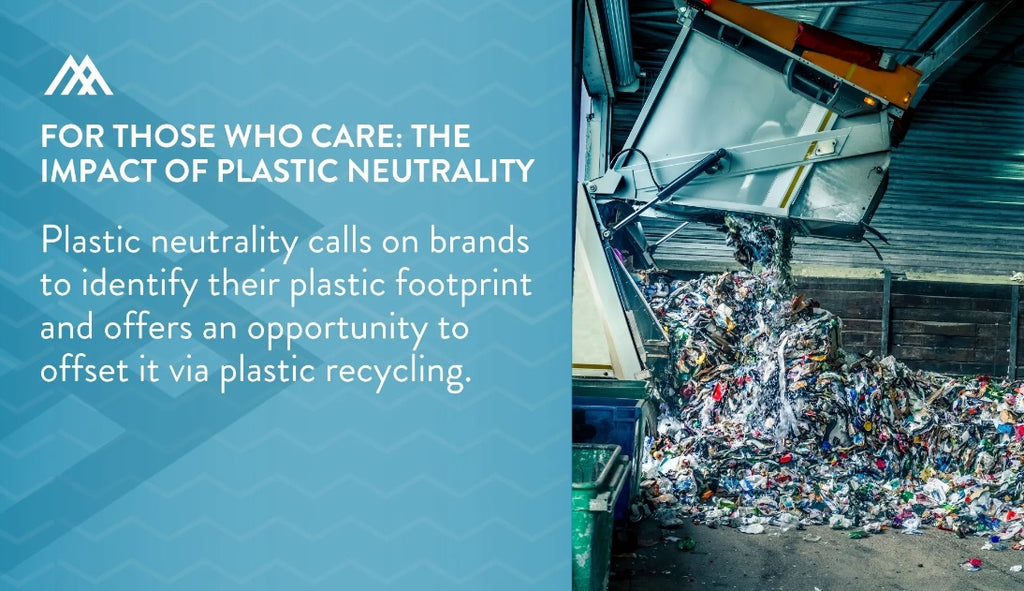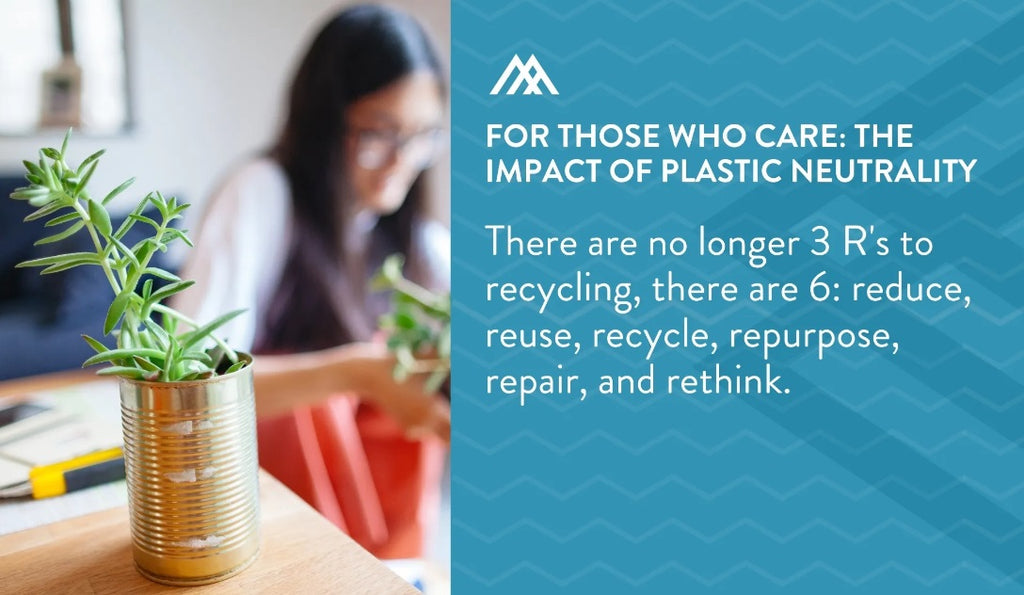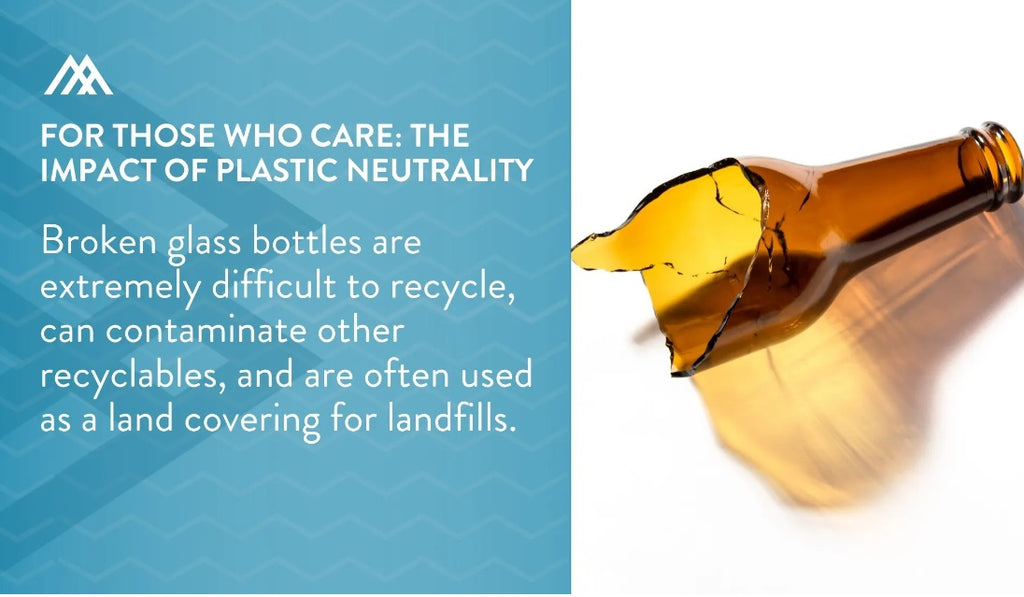Your Cart is Empty

July 21, 2021 4 min read
The idea behind plastic neutrality is ingenious. It calls on brands big and small to identify their plastic footprint (the amount of plastic they produce and send out into the world) and offers an opportunity to offset it via plastic recycling. Essentially, a brand can earn plastic neutral status when they achieve a net-zero plastic footprint.
First, brands are asked to quantify how much plastic they produce or use in weight. Then, plastic credits are issued to reduce its environmental impact and achieve a plastic neutral status. For example, if a company produces 10,000lb of plastic a year, their plastic offset credit will amount to ~$2,500 in donation dollars for grassroots waste management systems (like Waste4Change) and plastic recyclers. This money helps to improve working conditions and provide waste workers with steady, fair work while recovering and removing plastic waste from oceans and landfills.
Individuals can also become plastic neutral by calculating their plastic footprints and making a small monthly contribution to support the removal of plastic pollution from our waterways. rePurpose Global offers a free and easy-to-use online Plastic Footprint Calculator as well as resources for businesses of all sizes and industries to offset their plastic waste and go neutral.

Major brands (think Proctor and Gamble, Johnson & Johnson, etc.) are the ones creating new plastics, but 70% of all plastic waste is discarded by individuals.
If you want to get a bigger picture of how much plastic you use in a day, take a quick audit of your daily routine, or simply step into your bathroom. At every step of the way, you might be using plastic. For example:
The list can and does go on. Plastic products have become a staple in nearly every activity we do throughout the day. Nowadays, some companies are returning to simple, plastic-free packaging (like bar soap and shampoo), which helps to remove these plastic "touchpoints" from our days. While you might be a responsible consumer and recycle and even remove plastic from your routine, it's easy to see why we are in this situation today.
There are 7 common types of plastic and not all are created equally. The less durable types, your “low value plastics”, include things like chip bags, wrappings on toilet paper, plastic bags, cling wrap, etc. These low value plastics are less likely and less able to be recycled, so plastic recyclers and waste pickers see less value in collecting them. Nonetheless, they are clogging ecosystems and suffocating and entangling marine animals.

There are no longer 3 R's to recycling, there are 6: reduce, reuse, recycle, repurpose, repair, and rethink. By avoiding these types of plastics altogether, we can help to reduce ocean-bound plastics and leakage at the source. Here are some easy switches you can make to reduce plastic pollution:
At Amandean, sustainability and ethics are at our core. We wanted to provide all-natural, super-healthy nutritional enhancements to as many people as possible, while minimizing our contribution to climate change. We saw opportunities throughout our entire supply chain to reduce both our plastic footprint and carbon footprint.

We often get asked why we decided to stick with plastic containers for many of our supplements. Essentially it came down to three factors: 1) shelf stability and 2) recyclability and 3) carbon emissions. First and foremost, we needed a durable container to keep our supplements shelf-stable and prolong their life without adding unnecessary preservatives that take away from the purity of the product. Secondly, though glass is infinitely recyclable, this is only true when recycled properly and modern single-stream recycling hurts its true potential. Broken glass bottles are extremely difficult to recycle, can contaminate other recyclables, and are often used as a land covering for landfills. Finally, glass weighs much more than plastic. Though it might help to decrease plastic pollution, it increases carbon emissions with every order. Once we decided to stick to reusable plastic containers, going plastic neutral was a no-brainer.
We’ve partnered with rePurpose Global to remove as much plastic waste from our pristine planet and its oceans as we use in our packaging. We decided to use our plastic credits with our chosen waste management partner, Waste4Change. They are an environmental organization based in Indonesia that has managed more than 5.4 million kilos of ocean-bound waste since 2014.
While we may have landed on plastic containers for now, we are continually looking for new opportunities to reduce marine plastics and create, package, and ship products that improve the wellbeing of individuals, without taxing the health of our environment.
For more information about sustainable supplements, visit the Amandean blog.
Plastic neutrality calls on brands big and small to identify their plastic footprint (the amount of plastic they produce and send out into the world) and offers an opportunity to offset it via plastic recycling.
There are no longer 3 R's to recycling, there are 6: reduce, reuse, recycle, repurpose, repair, and rethink.
Avoid single-use coffee-cup lids, plastic straws, take-out containers, cutlery, and plastic bags by bringing your own reusable alternatives.
We’ve partnered with rePurpose Global to remove as much plastic waste from our pristine planet and its oceans as we use in our packaging.
Take our quiz and find which supplements your body is craving.


May 14, 2024 8 min read

May 07, 2024 6 min read

May 07, 2024 6 min read